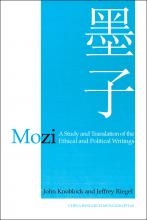The Moral and Political Naturalism of Baron Katō Hiroyuki
The Moral and Political Naturalism of Baron Katō Hiroyuki
Winston Davis
In this philosophical study of the later writings of the leading Social Darwinist of Meiji Japan, Baron Katō Hiroyuki (1836–1916), Davis argues that Katō developed his own philosophical "system." The study's purpose is to recover a "missing link" in the development of Darwinist social thought as a global phenomenon. As such, Davis engages Katō as a thinker and determines what was really at stake in his theory of moral and political naturalism.
As a nonprofit academic press, we need your support to publish our books. Your gift can help us make more of our titles available as e-books. DONATE NOW
Title information
In this philosophical study of the later writings of the leading Social Darwinist of Meiji Japan, Baron Katō Hiroyuki (1836–1916), Davis argues that Katō developed his own philosophical "system." The study's purpose is to recover a "missing link" in the development of Darwinist social thought as a global phenomenon. As such, Davis engages Katō as a thinker and determines what was really at stake in his theory of moral and political naturalism.
Winston Davis
Winston Davis was Wilson-Craven Professor of Religion at Southwestern University.
The Moral and Political Naturalism of Baron Katō Hiroyuki (JRM 13)
Abbreviations – vi
Preface – vii
1. The Ontology of Politics and Morality – 1
2. The Career of a Government Scholar – 10
3. Kato Hiroyuki and Ueki Emori on Natural Rights – 20
4. Kato's Theory of Evolution – 35
5. Evolution and Politics – 60
6. Kato's Theory of Religion and Ethics – 83
7. Evolution and the Doctrine of Progress – 103
8. Critique – 107
|
JOURNAL REVIEWS |
|
“[Davis] provides us with a careful, yet concise, explanation of the philosophy of an important Meiji thinker. It is a well-written book, in a series eminently suited to this more specialised type of monograph. While the topic might appear rather narrow, it deserves wide readership, and should be welcomed by many historians eager to see ‘what happened’ with Social Darwinism in the case of Japan.” ~Morris Low, Australian National University, in Asian Studies Review 22, no. 1 (1998): 121-124 (http://dx.doi.org/10.1080/10357829808713189) |
|
"[Davis' book] is well researched and deftly written, and makes a valuable contribution to the history of modern Japanese thought....Not only is Davis's study helpful in providing a view of the historical milieu in Japan just after the Meiji Restoration, but it also illustrates, if Kato may be taken as representative, just how difficult is to take in the subtleties of philosophical, scientific, political, and social thought of another culture within a single generation." ~Robert E. Carter, Trent University, in Monumenta Nipponica 52, no. 2 (Summer 1997): 274-276 (http://www.jstor.org/stable/2385579) |
|
"The book under review takes up Katō's naturalism in relation to politics and ethics. Winston Davis brings expertise in the history and sociology of religion to bear on Katō, analyzing his post-1882 writings on human rights. [Davis] turns a laser-like eye on Kato's one-track mind." ~George M. Wilson, Indiana University, in The Journal of Asian Studies 56, no. 4 (November 1997): 1097-1098 (http://www.jstor.org/stable/2658331) |


